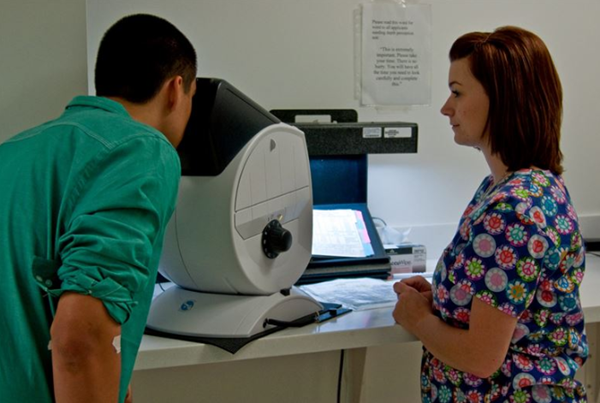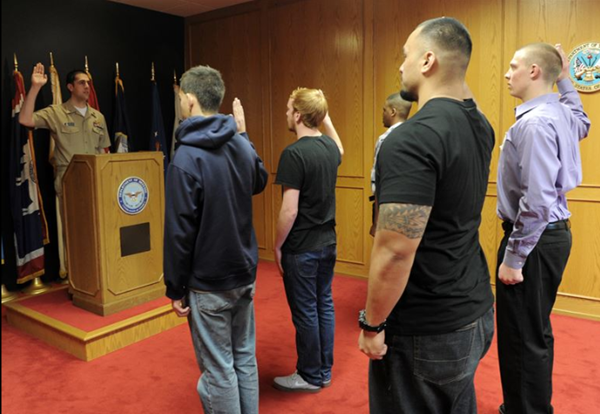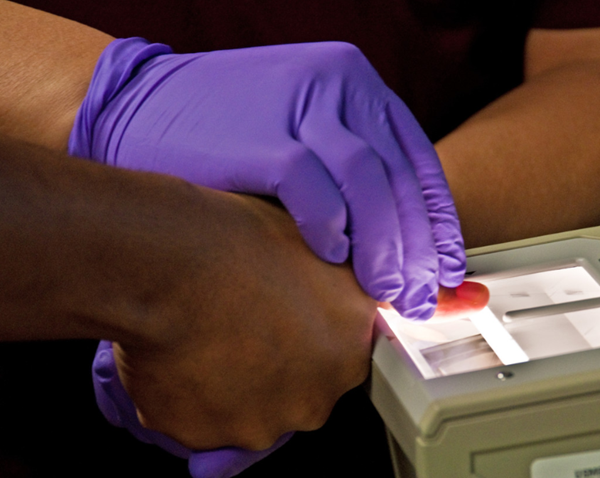All individuals looking to join the Armed Forces will be required to attend a Military Entrance Processing Station.
This process includes ensuring you are mentally and physically ready to join.
You may have heard that it can be hard to get through MEPS, or that bending the truth may get you through.
But, the truth is, being honest is the only way to pass MEPS, and having an understanding of what to expect will help you be successful.
This article will cover what MEPS is, why it exists, and what to expect while you are there.
Continue reading for your complete guide to MEPS.
Related Article – How To Join The US Military As A Non-Citizen
Table of Contents
What is MEPS?
MEPS stands for Military Entrance Processing Station.
This is a facility that is staffed by service members from all branches as well as civilians.
MEPS facilities are used to process individuals who are looking to join the Armed Forces by medically, physically, and morally screening them against Department of Defense standards.
Each individual branch has standards to which individuals must meet.
This process is done by visiting various stations at which you will perform medical and physical testing as well as completing questionnaires.
Where is MEPS conducted?

There are currently 65 MEPS locations throughout the continental United States, Puerto Rico, Alaska, and Hawaii.
They are conducted in almost all continental states.
MEPS facilities are considered military stations that are run by members from all military branches.
They are broken into Western Sector and Eastern Sector installations.
You can find a complete list of locations here, along with details about each location.
Why is MEPS conducted?
MEPS is conducted to ensure that individuals meet the medical, physical, and mental standards set by each branch of service.
This screening process tests individuals in varying ways, verifying that applicants can meet the demands required for each job.
Each branch has certain requirements regarding medical history, height and weight, and physical fitness requirements.
The military is physically and mentally demanding.
MEPS is used to ensure that you can meet those demands without causing harm to yourself or to others.
During this process, an applicant’s aptitude will be tested, and individuals will learn which jobs they qualify for.
What Happens at MEPS?
MEPS includes pre-screening, ASVAB testing, (if you did not take it previously), medical evaluations, and enlistment activities.
Pre-screening is the first step of your MEPS visit and occurs with your recruiter prior to attending MEPS.
The day before visiting MEPS, you may be asked to check into a nearby hotel to go over a briefing on what will happen the next day. You’ll be told what you can and cannot bring.
Once you arrive at MEPS, you will receive identification tags and complete identification processing.
Early in the day, you will be asked to take the ASVAB test.
After taking the ASVAB test, or if you have a qualifying score, you’ll move on to the medical evaluation.
Evaluation includes discussing your medical history, completing a physical examination, as well as other medical tests.
After performing medical testing, you will work with a counselor to select a job in the field you would like to join.
When your job has been chosen, you have completed your Pre-Enlistment Interview.
Then, you can sign your contract and take your Oath of Enlistment.
Check out the required ASVAB scores for jobs in each branch of the military below:
MEPS Pre-Screening

Prior to actually attending MEPS you will complete a pre-screening process with your recruiter.
This process includes a Medical Pre-screen of your Medical History Report.
They are looking for any immediate disqualifying factors and basic medical information that might require additional screening later.
Your recruiter will ask questions regarding any previous medical conditions and injuries.
You will learn of any conditions that require you to bring supporting medical documentation when you go MEPS and any that are disqualifying.
Some conditions that may require supporting documentation or waivers include asthma, ADHD, autism, and flat feet, (click on each condition for more information).
You can be disqualified at this point of the process for serious medical issues that would affect service such as being blind, having certain disorders such as Bipolar Disorder, or for lying to your recruiter.
ASVAB Test
The Armed Service Vocational Aptitude Battery Testing (ASVAB) is a series of tests that measures your aptitude for certain career fields.
Often, this test is taken in high school or prior to attending MEPS.
If you haven’t taken the ASVAB prior to attending MEPS, you’ll need to complete the test before completing the medical screening portion.
You should take the ASVAB seriously because it will determine not only your ability to get into the Armed Forces but which MOS, AFSC, or Rating that you qualify for.
Each branch has a minimum score on the Armed Forces Qualification Test (AFQT).
This component of the ASVAB test measures your overall performance and determines if you qualify for service.
This score is calculated on your scores on general knowledge topics, such as Arithmetic Reasoning, Mathematics Knowledge, Paragraph Comprehension, and Word Knowledge.
The other portions of the test will determine your aptitude for certain areas such as Electronics or General Science.
Each MOS, AFSC, or Rating will have minimum scores for certain areas of the ASVAB test relating to the job function.
MEPS Medical Evaluation/Testing
At MEPS you will conduct several different medical evaluations and tests.
These tests are conducted to ensure you meet the qualifications for the branch you wish to join, the position you are aiming for, and that you meet the Department of Defense regulations.
Prior to a medical briefing, your blood pressure, vision, and hearing will be checked.
Blood Pressure, Pulse, and Temperature
These tests are less invasive and can be completed relatively quickly, barring any issues.
Blood pressure tests will be taken using a standard cuff with the applicant in the seated position, with both feet flat on the ground.
Tests are considered abnormal if the Systolic measurement is above 140mmHg or the Diastolic measurement is greater than 90mmHg.
When having your pulse checked, under 60 BPM or over 100 BPM is considered abnormal.
It is common for people to be nervous at MEPS and it can sometimes be high.
If it is high, the physician will check for other symptoms. If none are found, an EKG may be recommended.
Temperatures are taken and are required to be below 100.5 degrees Fahrenheit.
If the temperature is above 100.5 they will require you to return in 48 hours to get another reading.
If you do not pass the tests performed in the blood pressure, pulse, and temperature section, you will not be immediately disqualified but asked to return at a later date after potential additional medical visits.
Related Article – How To Join The Us Army
Hearing and Vision

Hearing tests (Audiogram) will be completed, testing for normal hearing limits.
Vision tests will be conducted to meet the vision standards set by your branch or specific jobs.
Included with the vision tests will be color vision testing such as the PiP test, FALANT test, and Army Red/Green test.
These tests include reading color numbers on plates and results in a simple “pass” or “fail”.
An Ortho-Neuro evaluation will be completed to test your balance.
Applicants are tested on depth perception and will be required to complete further testing if they fail portions of the test or any other test covered in this section.
Medical Brief
A medical brief will be conducted after the basic testing.
This is when you will learn how to and begin to fill out the following documents:
- DD Form 2005, Privacy Act Statement – Health Care Records
- DD Form 2807-1, Accessions Medical History Report
- DD Form 2808, Report of Medical Examination
- UMF 40-8-1-E (Drug/Alcohol and HIV Acknowledgement)
- USMEPCOM Form (UMF) 40-1-15-1-E (Supplemental Health Screening Questionnaire)
- Standard Form (SF) SF507 Medical Record
- UMF 40-1-18 (Identifying/Permanent Markers/Piercings)
Alcohol/Drug Testing
Immediately following completing the medical briefing you will be required to complete a breath alcohol test.
You will complete urinalysis testing including drug testing as well.
It is best to be completely open about any drug or alcohol use, as they’re going to find out one way or another!
Physical
A complete physical will be done on all individuals.
This will require you to be viewed in your undergarments.
Women will complete physicals separate from men, and in private.
Some of the physical will be covered during the medical briefing, and the rest will be completed by a provider.
Areas will be examined and marked either normal, abnormal, or not examined.
Examiners are looking for lesions, abnormalities, inadequacies, history or indications of surgery, and other oddities.
Areas to examine include:
- Head, face, neck, scalp
- Nose, sinuses, mouth, and throat
- Ears
- Eyes
- Heart
- Lungs, Chest
- Vascular System
- Rectum
- Abdomen
- Genitalia
- Upper and lower extremities
- Feet
- Spine
- Dental
- Skin
Some abnormalities are considered disqualifying, while others may require waivers or additional medical screening.
Height, Weight, and BMI
You will have your height measured without shoes and socks, rounded up to the nearest half inch.
Your weight will be measured in underwear, rounded to the nearest pound.
Not meeting height requirements for your branch of service will result in a permanent disqualification.
You can obtain a waiver to attempt to enter at your current height.
If you are overweight, you will be required to lose the excess weight before returning to MEPS.
You will receive an RJ (Return Justified) date with 4 calendar days for every 1 pound you are over.
A Gulick II tape measure will measure your body fat.
The minimum BMI is 19 with a BMI of 17.5 or less being temporarily disqualifying.
Orthopedic/Neurological
To test for any muscle, coordination, or posture issues, a fitness test will be performed.
This can include standing and moving in distinct ways.
Medical History Interview
All applicants will be questioned on their medical history.
This is conducted in private between a medical professional and the applicant only.
They will ask you to go over the documents you had previously completed as well as additional information.
You will be asked about items such as previous medical history, procedures, and drug use.
Related Article – Coast Guard Jobs: A List of all 24 Jobs in The Coast Guard
Behavioral Health
The Military wants to ensure that you are prepared for the mental challenges presented while serving.
All applicants will go through an Applicant Behavioral Health interview.
During this process, it will be determined if applicants meet the medical standards for behavioral health.
Medical history, answers on forms, and a discussion will all be used to ensure applicants meet those standards.
Additional screening may occur if the professional has any questions on history or behavior.
Swearing-In Ceremony

Once you complete all testing and are deemed qualified for service, you will meet with a representative from your branch of service.
You will select your job and then discuss your contract.
After you have signed your enlistment contract, you will participate in the Oath of Enlistment Ceremony.
The Oath of Enlistment Ceremony, or Swearing-In Ceremony, takes place at the MEPS office.
When swearing in, the Enlistment Officer will have you repeat the enlisted or officer oath.
You raise your right hand and repeat the Oath after the officer.
When scheduling your MEPS appointment, you will be provided with an approximate time that you will be swearing in.
You are allowed to provide this time to your family so they can be present when you swear in.
At this time, you have signed your contract and agreed to serve your country.
How Should I Prepare For MEPS?
Preparing for MEPS should be like preparing for a job interview.
You want every piece of documentation that you might need ready to go, and you want to be professional.
You should dress in cool, comfortable, (but appropriate) clothing and ensure you are wearing underwear (you will be performing a physical in them later).
Comfortable clothing does not include clothing that shows excessive skin or is something that you would wear to bed.
Do not wear any jewelry, hats, or other unnecessary items.
You will be provided with stations to place personal items while you are performing testing, and these are not always secure locations.
To prepare for MEPS, gather medical history information prior to heading to the station.
Speak with family members to see if there are any rare conditions, childhood diseases, or other information that may seem important.
Ensure you bring your ID, birth certificate, Social Security card, and any medical documents.
If you wear contacts or glasses, bring them with you, as well as a copy of your prescription.
You must also bring your USMEPCOM Form 680-3A-E, Request for Examination.
Once inside the facility, keep talking to a minimum.
You will be moving from station to station and required to focus on the questioning or task at hand.
Try to be professional and keep in mind that this is your interview before you sign your contract.
Related Article – Navy Jobs List: A List Of All 93 Ratings In The Navy
Frequently Asked Questions
How long does the MEPS process take?
The MEPS process length depends on how many applicants are scheduled on the day you attend.
It can take anywhere from 6-8 hours to two days, although that is not as common.
It also depends on how prepared you are and if you have taken your ASVAB test prior to attending MEPS.
Be prepared to be there for the entire day into the late evening.
Are there any special tests/considerations for female recruits at MEPS?
Yes, there are special tests and considerations for women.
When completing their physical, women will be taken to a private area.
Other considerations include having different height and weight requirements.
Female recruits are also required to take a pregnancy test at MEPS.
Can you have your phone at MEPS?
Yes, you can have your phone with you at MEPS.
However, they are only generally allowed in the waiting area and are not allowed in any testing area.
What happens if I fail MEPS?
In short, it really depends on the reason that you fail MEPS.
There are various ways to fail MEPS and differing repercussions.
Some disqualifying events, such as not disclosing color-correcting contacts, will result in an N status and you will not be able to complete processing for six months.
If you do not meet certain qualifications, such as weight or body fat requirements, you will be given a date to return to MEPS and must meet the qualification at that point.
These disqualifications use code 3T- Temporary Disqualification.
For some tests, such as blood pressure, you could be asked to see a private health care professional to get separate readings and potential evaluation on why it is high.
This would result in your case needing further review and you leaving with an O- Open Status.
A permanent medical condition that does not pass qualification standards will result in a 3P disqualification.
You can attempt to apply for a waiver in this case.
For disqualifications that result in not being fit for service or a denial of a waiver, you will not be permitted to join.
It is possible to discuss with a recruiter to see if another branch of the Armed Forces is an option.
Related Article – Marine OCS Guide
Conclusion

In summary, your MEPS visit does not have to be something you dread.
Be honest, move quickly, and comply with all tasks, and you will get through the process as quickly as possible.
MEPS begins with pre-screening at your recruiter’s office and ends with taking the Oath of Enlistment.
This day should not be taken lightly, but by following this guide, you can ensure you are properly prepared.
References:
- Ikon Pass Military Discount: Learn How To Save Big - January 31, 2025
- RTIC Military Discount: Find Out How To Save Big on Gear - January 30, 2025
- Traeger Military Discount: Learn How To Save Big on Smokers - January 28, 2025



What type of drug test do they do at MEPS? I smoked marijuana a month ago (or technically vaped) with someone I met while travelling. I have only smoked a handful of times in my life and it just happens to be a month ago, but I can wait. I can wait 3, 6 or 9 months before enlisting. I’m in no rush, but I just want some data to define my decision and not be in guess land. I understand if I fail at MEPS and don’t get a waiver, I might not get a second chance? Also I scored really high on the mock ASVAB at army career center. Anything was opened to me. This might close things to me that I might want, correct? I don’t want to fail the test.
Hey Man,
Great question. I would 100% hold off on MEPS for at least a few months. The military has very little tolerance for positive drug tests, and if it comes back positive, you can kiss your chances of joining any branch goodbye. Don’t smoke again, and go through the process in a few months. BTW, I’m fairly sure they do a urinalysis test with a screening level of 50 nanograms per milliliter. Hope this helps and good luck!
Rob V.
OMK Founder